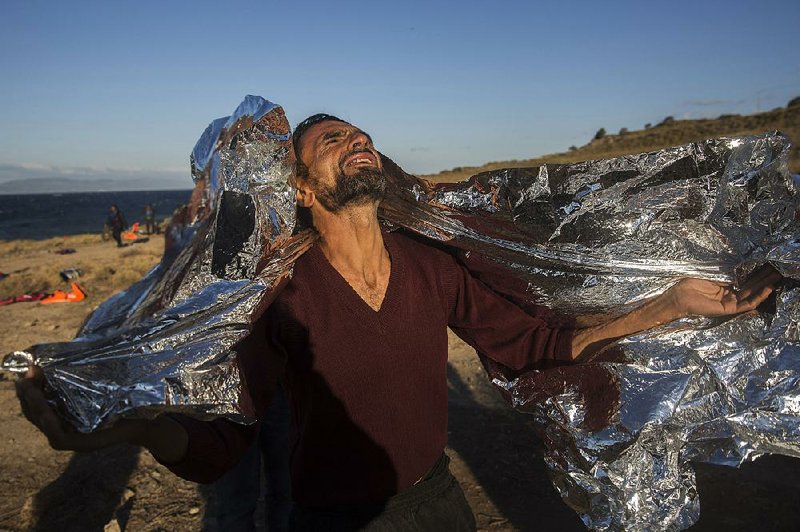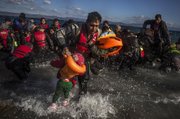VIENNA -- Austria, a strong critic of fences built to cope with Europe's migrant influx, on Wednesday announced it is joining other nations that have either already erected border barriers or are planning to do so.
Austrian Interior Minister Johanna Mikl-Leitner insisted the move was aimed solely at bringing order to the unrelenting influx of people entering the country, telling Parliament there were no plans "to build a fence around Austria."
Slovenia, the main entry point into Austria, also said it was ready to build a fence, while Hungary has been championing the success of its razor-wire border fences with Serbia and Croatia and plans another one with Romania.
Greece erected a barbed-wire fence three years ago on a section of its border with Turkey that is not separated by a river. Bulgaria also has fenced off parts of its boundary with Turkey, while some Baltic states plan to erect fences on border segments with Russia.
But all of these existing or planned fences are either on outer EU borders or between two EU countries where one is not yet part of the Schengen Agreement, which is meant to ensure the free movement of persons.
The Austria-Slovenia border is part of the agreement, however, and any barriers erected on it would be closely watched for possible violations.
Germany, the country of choice for many fleeing regions torn by war and hardship, also signaled its intention to reduce its load of asylum seekers. Syrian citizens are mostly being accepted, but Interior Minister Thomas de Maiziere said many of the Afghans pouring into the country will likely be sent home.
"People who come to us as refugees from Afghanistan cannot all expect to be able to stay in Germany," he said, adding that Afghans will be considered on a case-by-case basis.
In Austria, Mikl-Leitner told Parliament that the construction of "technical barriers" would begin after about 10 days of planning but gave no date for the start of the project.
Speaking to state broadcaster ORF, Mikl-Leitner cited the need for a fence to maintain public order. Defense Minister Gerald Klug said containers or railings could be set up to "control the refugees in an orderly way."
Since Hungary sealed its borders with Serbia on Sept. 15 and Croatia on Oct. 17, thousands of migrants have been flowing into Slovenia daily. From there, they go to Austria, with many continuing on to Germany.
Slovenian officials, who say their small nation cannot cope with the influx, have warned for days that they would take action if Austria or Germany tried to close off their borders.
Slovenian Prime Minister Miro Cerar firmed up those plans Wednesday.
"If necessary, we are ready to put up the fence immediately" if a weekend plan by EU and Balkan leaders fails to stem the migrant surge, he said.
Relations between Germany and Austria have been strained in recent days, with Germany accusing Austria on Wednesday of dropping asylum seekers near the border after dark without warning.
Mikl-Leitner acknowledged a possible effect on migrants in Slovenia if Austria built a border barrier -- a situation she said Austria already is struggling to deal with "because Germany is taking too few."
"People are marching toward Germany because they feel they are invited there," she said, alluding to perceptions that German Chancellor Angela Merkel has suggested all who have a right to asylum are welcome.
Merkel has said European countries have a duty to protect those who have a right to shelter, but she also said that all countries must share the burden. About 577,000 people seeking asylum arrived in Germany from January to the end of September this year, 164,000 of them in September alone, authorities say.
De Maiziere, Mikl-Leitner's German counterpart, said it was Austria's fault that "refugees are driven to certain points without warning at the fall of darkness."
"Austria's behavior in recent days was out of line," he said.
German police have sought to keep the number of people crossing the border to 50 per hour at each crossing, according to Bavarian authorities.
On Wednesday, a Bavarian state lawmaker said Merkel's decision not to apply European Union rules in her handling of the region's migrant crisis violates German laws.
"The German federal government is clearly overstepping its constitutional competencies at present," Bavarian Interior Minister Joachim Herrmann said Wednesday on ZDF public television. "It is not in the power of the federal government to just override and no longer apply existing European and German law."
The EU agreement requires refugees to be registered in the countries where they apply for asylum and allows bloc members to send back those who have been registered elsewhere. Germany can no longer take the 9,000-10,000 asylum seekers entering the country per day in violation of those rules, Herrmann said.
Meanwhile, on the EU's edge, the Greek coast guard said it rescued 242 people off the eastern island of Lesbos on Wednesday after the wooden boat they traveled in capsized, leaving at least three people dead.
Rescuers continued to search the rough waters for more survivors, and the coast guard said it remains unclear how many people were on the boat when it went under.
The International Organization for Migration said in a statement that some sources reported 200 people were onboard the boat, while others had said there were 300.
Information for this article was contributed by Geir Moulson, Ali Zerdin, Jovana Gec and Dusan Stojanovic of The Associated Press and by Rainer Buergin of Bloomberg News.
A Section on 10/29/2015



